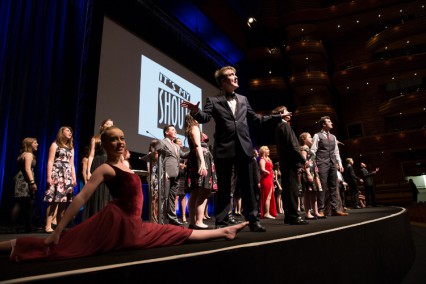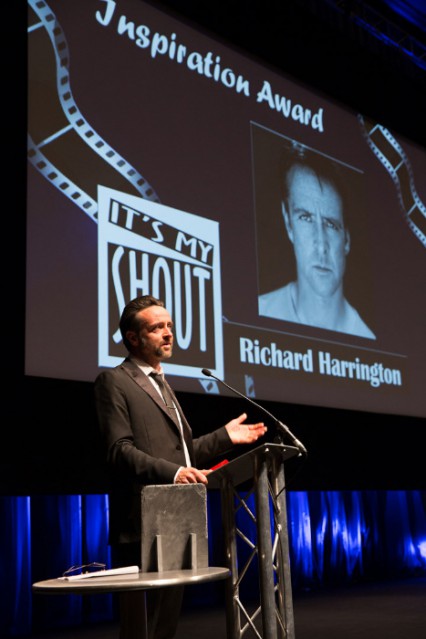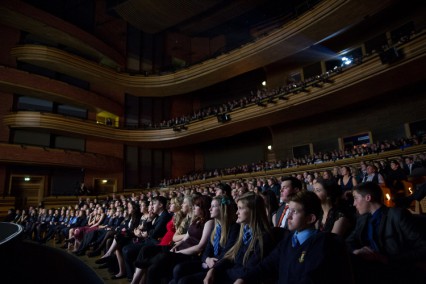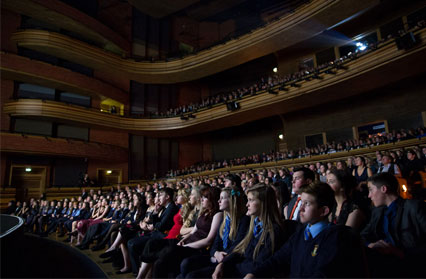It’s My Shout Productions
11-14th October, 2014
St. David’s Hotel and Wales Millennium Centre, Cardiff
Reviewers: Peter Gaskell and Julie Bainbridge
It’s My Shout Productions was originally conceived as a creative outlet for under-represented groups and disadvantaged individuals. Over the last twelve years the programme has played a key role in developing emerging creative talent in Wales. Working in partnership with Creative Skillset, BBC Cymru Wales, S4C and Arts Council Wales, it’s known for its summer series of short films broadcast on BBC Cymru Wales and S4C. It’s My Shout has been a springboard for actors and producers with alumni that include Chris Jacobi, Aneurin Barnard and Tom Cullen and has earned four BAFTA Cymru awards. Film Fest Cymru is a new initiative; a weekend of workshops, forums and speakers culminating in an Oscar-style awards ceremony celebrating emerging Welsh talent. It’s a script that works well and with the right partnership, there could be enough material to make this into an annual week-long Welsh film festival. Here’s a selection of reviews from the weekend:
Workshop: Funding for Writers, Directors and Producers
Led by Hannah Thomas, Head of Creative Set Development for Ffilm Cymru Wales and Katherin Pither of BFI’s Net.work scheme, we considered funding opportunities and production support available for emerging film producers. There is currently a general sense of growth in the Welsh film industry with excitement over the relocation of Pinewood Studios to Wales. Thomas gave practical advice on how to seek development funding and mentoring, explaining that the usual gestation period for a film from development to final cut was around seven years. Other support through the BFI Net.work organisation and the Horizons Fund was also presented in this practical workshop.

In conversation with Phillip John
Phillip John’s insider view of the film business was particularly interesting as it related to directing actors. A Newport film school graduate, Phil didn’t have much idea what the job of director was when he started. A valuable asset was being very confident of his own worth which stood him in good stead while being tested by his actors on the sets of New Tricks and Downton Abbey. On occasions he was obliged to negotiate some hostility in getting his way with them.
His main advice was to find your own voice. If you are distinctive, you will get noticed. It helps if you can find an agent. Work on what you interests you in the way that you like it (e.g. he will always seek opportunities to soundtrack his film work with his punk-flavoured favourites), talk to and work with others sharing similar interests and goals, read and watch a lot of films. In particular, watch out for the Downton spinoff at Christmas with a special appearance by a most newsworthy actor whom he has persuaded to appear.
Workshop : Get The Part – Roger Burnell
Technically, there are three phases an actor must go through before he/she can play a part effectively, or as Roger memorably put it, to ‘cement yourself into the moment’. First find a way of relaxing (using breathing techniques for instance) before concentrating on what you are trying to project as character to your audience, then apply it in performance.
Yet this session was about the psychology of actors as much as technique for getting a part. Actors are frequently insecure people lacking confidence about their ability and Roger mentioned some names that surprised me. At a dinner he attended, he noticed the confident competitiveness of comedians who were seeking to outdo each other, in contrast to straight actors who were more often introverted or retiring when not in character. Their acceptance as performing artistes by their audience is their therapy. Successful performance is delivered either by projecting forcefully or drawing the audience into the world of their character and its psyche.

Photo Courtesy of Mission Photography
Forum: The Future of the Arts in Wales
In this session, the future of arts in Wales was discussed by Elis Owen (former Head of ITV Wales and former Commissioner for BBC Cymru Wales), Phil George (Green Bay Media), Roger Burnell (It’s My Shout Productions), Michael Goode (Arts Council of Wales) and Dr. Jayalakshmi (School of Media, University of South Wales). It was generally felt that media arts were strong in Wales, with Dr Who, Da Vinci’s Demons, the relocation of Pinewood Studios and the BBC to Cardiff cited as examples of how the industry is thriving. The Welsh Government had been good at supporting the arts, but cuts in funding were predicted. Phil George believed the way forward was collegiate; for the arts community to join forces and take ownership of funding opportunities in the industry. It was noted that while arts funding in Wales was considerable, there was a general lack of awareness of the wider international film market and a passivity which was leading to fewer people entering the industry. This had led to an influx of English production companies taking advantage of opportunities in Wales and bringing their own production teams because of a lack of local experienced production crew. Dr Jayalakshmi believed that the way to redress this problem was through more training. Michael Goode acknowledged the gap in supplying the industry and wanted to see more organisations like It’s My Shout identifying emerging talent. In conclusion the panel wanted to see more surprising content from new talent; more networking opportunities for film makers in Wales throughout the year; the Film Fest evolving into a major film festival of workshops, events and networking opportunities, and more opportunities for people to get involved at grassroots level.
Workshop: Comedy writing
Kirsten Jones and Boyd Clack gave a master class packed with practical advice about writing comedy drawn mainly from their experience of co-writing High Hopes for BBC. They stressed the importance of structure so that you know the shape of your story and where you are going with an episode before you start writing dialogue. Often the episode will start with a subplot which eventually helps resolve the crisis of the main plot. Typically a script will be for 28 minutes broadcast with scenes lasting about six minutes. Each episode will have a theme, for example death, religion, politics, sex.
An important element in the art of writing any drama is that your characters should speak in distinctly different voices. Kirsten and Boyd do not write antagonists into their drama but show their characters responding to antagonistic situations. While High Hopes is intended to have a kind-hearted tone, their advice was not to be afraid of writing comedy out of such drama out of serious issues such as marriage breakdowns. Pathos is used sparingly – perhaps one scene per episode.
The writer is not looking to set up gags in the plot. Humour rather develops from the response of a character to their situation. Jokes must be relevant to the theme. If it is an old joke the audience is familiar with in another context, that is fine. Seeing the joke in the new context of your screenplay, they are likely to take delight in it.
As a comedy writer, one should be realistic about the high probability your script will not be broadcast even if it is sparklingly entertaining. Boyd Clack said there is no guarantee that the first person to read it is more than a half-wit. He knew highly-gifted actors who had no career success and mediocre actors who were able to make a comfortable living from their performances. The same is true of writers. The important thing to remember is to keep going, don’t be deterred by the statistics, and have fun doing it. To make others laugh, you have to make yourself laugh first.
Interview with Roger Burnell (Managing Director, It’s My Shout Productions).
Where did the idea for the Film Fest event originate?
Last year the company celebrated the completion of their film production programme with a Première Awards event to provide a platform to showcase emerging talent. This year, the Arts Council Wales suggested extending the event to draw in writers, designers, producers and directors and to invite former participants in the scheme to show how the company had helped to launch their careers.

How many people do you support and develop over a twelve month period?
Probably a couple of thousand. It might be that we do a workshop in a rugby club in Treorchy or we might go to a film school to work with students. We do projects across Wales throughout the year. The films we produce and shoot in the summer for the BBC and S4C are a twelve month project, which starts with meeting commissioners to identify what will appeal to their coming year’s season.
Are all the films produced, ‘shorts’?
Yes, generally about ten minutes, but we’re shooting one in the spring which is about half an hour. It also depends on what the broadcasters are looking for. Next year, for example, we’ll be sending people into communities with a view to shooting drama and also documentaries.
Where did the company originate?
I set the company up as a scheme fourteen years ago as an opportunity to give deprived young people a voice through film. I came from a theatre and teaching background and went on to work in the film industry. I think there should be more collaboration between theatre, television, film and writing. Most film courses focus on production, neglecting the importance of writing in film making and television opportunities. All drama on television is film.
How true would that be of locally provided film courses?
My own view is that while film makers should learn film theory and create their own vision, if they want to get work in the industry, they need to consider the local opportunities available which tend to be mainly in television. Da Vinci’s Demons are technically six feature films, all produced in Swansea. It’s high-end television produced as film. People need to be cute to what opportunities are available in Wales. We need to find out what people want and then be unique. Phil John is a brilliant example of a film maker who has moved further into television work because of the greater opportunities. He demonstrates the multiple pathways that new talent can take to work in the industry.
In the main, are most of your participants young?
No, this year our oldest participant is ninety-nine years old, a leading actress in one of the films.
How does your mentoring work?
We take our trainee crew, producers and directors and place them with mentors who are not allowed to take ownership of the production. Trainees may be young people or older people at a certain stage in their career who feel they need more or different experience. We also see producers who need to develop their creative skills and new directors emerging from film schools who have yet to make the right network connections.
Do you work with Skillset Wales?
Yes, in the last eighteen months they have given us funding to create the talent pool. We also work and receive funding from the Arts Council of Wales and get advice and mentoring support from BBC Wales and S4C. This weekend event was a trial which has proved hugely successful. I’m hoping that there will be opportunity to develop it further next year and perhaps link up with the Cardiff film festival.












